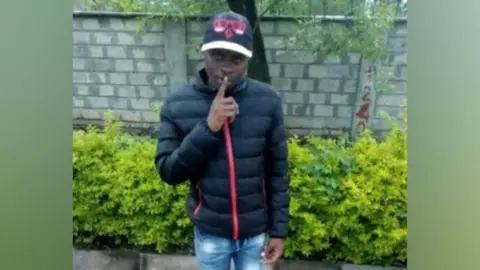Kenyan vendor shot by police during protests dies after life support switched off
 Boniface Kariuki's family
Boniface Kariuki's familyA street vendor shot in the head by police during protests two weeks ago has died a day after being declared brain-dead in hospital, his family says.
"Boniface is no more. We have just viewed his body," family spokeswoman Emily Wanjira told the BBC.
Boniface Kariuki was shot as police cracked down on a protest in the capital Nairobi against the death in detention of blogger and teacher Albert Ojwang, 31.
Kariuki, a mask vendor, was shot at close range on 17 June, and later admitted to the main public referral hospital in Nairobi for treatment.
He spent nearly two weeks on a life-support machine, before his family were told by doctors that his heart was still beating but his brain had ceased to function.
Doctors had carried out several operations but some bullet fragments were reportedly still lodged in his brain.
News that he was brain dead had sparked further public anger over alleged police brutality, with increasing demands for justice.
Many Kenyans have also urged the government to settle the hospital bill after Mr Kariuki's family had appealed for public donations.
Two police officers have appeared in court over his shooting, but have not yet been asked their pleas. They remain in custody pending the outcome of investigations.
On Sunday, Mr Kariuki's family urged authorities to speed up investigations and ensure they get justice.
- Are East African governments uniting to silence dissent?
- Why the death of a blogger has put Kenya's police on trial
Kenya has seen a wave of protests in recent weeks, fuelled by accusations of police brutality.
At least 19 people were killed last Wednesday, rights groups say, however the authorities have blamed the violence on protesters, saying they set out to attack police stations and officers.
On Monday, Director of Criminal Investigations Mohamed Amin told journalists that a total of 485 people have been arrested for a range of alleged offences, including murder, terrorism, rape, looting, destruction of property and attacks on police officers.
"No-one will hide behind peaceful protest to commit criminal acts," Amin said. "We are analysing CCTV footage, mobile phone data, and digital communications to track those involved in the violence. More arrests will follow.
"Intelligence and arrest records reveal that some individuals had specific instructions to attack public institutions and security installations," he added.
The DCI chief also said that at least 11 police officers were seriously injured during the protests - some with life-threatening wounds.
Kenya's Interior Minister Kipchumba Murkomen last week described the protests as "terrorism disguised as dissent".
He urged officers to "shoot on sight" civilians who attacked police stations, sparking further criticism from lawyers and rights groups.
In another related development, a Kenyan High Court ordered Police Insp Gen Douglas Kanja to produce missing blogger Ndiangui Kinyagia within 24 hours, or appear in court the next day to explain his whereabouts.
He was reportedly detained by security officers last week but has not been seen since.
More about Kenya from the BBC:
 Getty Images/BBC
Getty Images/BBCGo to BBCAfrica.com for more news from the African continent.
Follow us on Twitter @BBCAfrica, on Facebook at BBC Africa or on Instagram at bbcafrica
